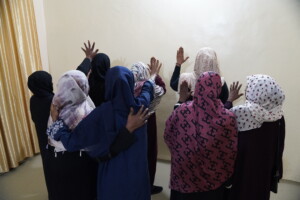Displaced support report on mass rape in North Darfur
Internally displaced people in the western region of Sudan speaking to Dabanga Sudan have welcomed a human rights report published on Wednesday, that confirmed that a mass rape by Sudanese soldiers took place in October last year. The Sudanese Foreign Ministry has dismissed the report’ s findings.
Internally displaced people in the western region of Sudan speaking to Dabanga Sudan have welcomed a human rights report published on Wednesday, that confirmed that a mass rape by Sudanese soldiers took place in October last year. The Sudanese Foreign Ministry has dismissed the report' s findings.
The researchers of Human Rights Watch (HRW) found that 221 women and girls were raped in Tabit in October in 2014. Among them were victims under the age of 18.
Yagoub Mohamed Abdallah, the general coordinator of the Darfur Displaced and Refugees Association, called via Radio Dabanga on all the Sudanese and also the United Nations, the Security Council and the international community to “stand behind the report and take the perpetrators to justice”. The perpetrators are reportedly soldiers of the military garrison close to Tabit.
According to HRW, which spoke to four soldiers, they were given orders to rape women during the attack on 30 October, 31 October and the early morning of 1 November. Jonathan Loeb, one of the authors of the report published on Wednesday, told Dabanga: “This [defected soldier] told us that he believes that [the military] were attacking the town and punishing the population because they believed that this population was supporting the rebels in some manner. That said, through our investigation, we did not find any evidence that there were any rebels in Tabit.” (audio of the interview: here)
Hussein Abu Sharati, the spokesman for the Darfur Displaced and Refugees Association, also welcomed the results of the report, 'Mass Rape in North Darfur: Sudanese Army Attacks against Civilians in Tabit'. He considered the issuance of that report as “a day of joy for the victims.
“The displaced persons are willing to provide any additional information about Tabit and others upon request, provided that the request comes from an independent and impartial entity amid full protection for the witnesses,” the spokesman for the refugee association claimed.
Sheikh Abdal Razeg Mohamad Yousif Suleiman, a member of the leadership of the camps in Darfur, after reading the HRW called on the Sudanese to go out in popular demonstrations for justice for the victims of the rape.
Sudan dismisses findings
Sudan’s Foreign Ministry spokesman, Yousef El Kordofani, said that Human Rights Watch’s confirmation of earlier allegations of the mass rape in the North Darfur village is an attempt to reproduce a closed issue that has been proven to be false.
“It is not conceivable that that many women were sexually assaulted without people protesting the rape afterwards.”
He expressed that Sudan regrets the fact that the human rights organisation adopted the allegations. “The main source [for the claims] is the Netherlands-based Radio Dabanga, which has no credibility and is the mouthpiece of Darfur rebels”. He accused rebels of making these allegations to suggest that the situation in Darfur is still unstable and that time has not yet come to repatriate displaced people back to their villages.
El Kordofani argued that reports of a mass rape of more than 200 women is “not compatible with logic […] as Tabit is small village with a tiny population”. “It is not conceivable that 200 women are sexually assaulted in one night without protests or demonstrations afterwards.”
Pressure for further investigations
Dabanga Sudan published the first reports on the mass rape in Tabit on 2 November 2014. Sudanese authorities initially prevented a verification team by the UN-African Union peacekeeping mission in Darfur (Unamid) from probing the claims, but allowed them to visit the area one week later, on 9 November. A day after the visit, the research team said that it found no evidence confirming the mass rape claims.
Sudanese officials were angered when UN officials stressed the need for further investigation because the investigators were followed by military and police forces everywhere they went during the first probe. Since then, Sudan refused to authorise a second investigation and called publicly for an exit strategy for the Unamid from Darfur.
On Wednesday, the spokesman for the UN Secretary-General Ban Ki-moon, Stéphane Dujarric, called on Khartoum to allow a research mission by Unamid to investigate the rape claims and to allow “safe, unhindered access to the town”. Human Rights Watch has called on the UN and the African Union to press Sudan to allow peacekeepers unfettered access to Tabit and to ensure that medical services are available to all those in need.











 and then
and then